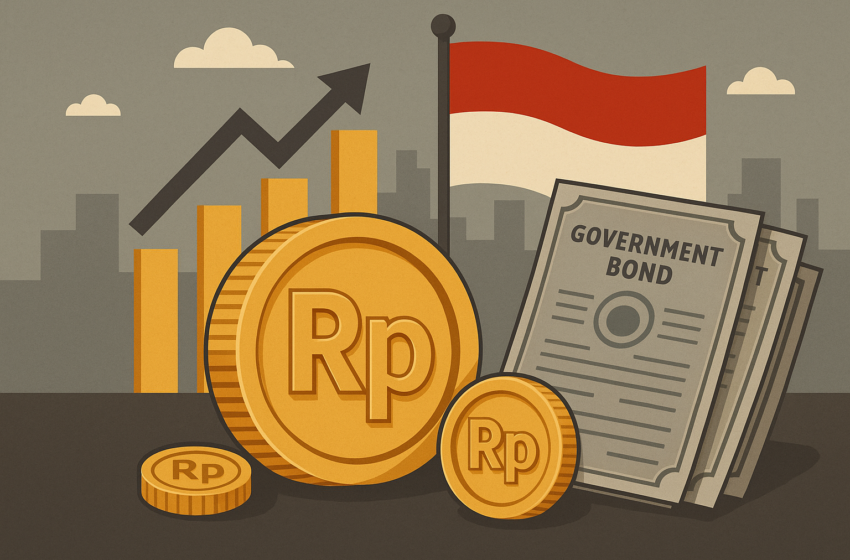Fidelity Macro Chief Discusses Next Bitcoin Bull Market as Cycle
Bank Indonesia moves to issue a national stablecoin backed by government bonds
(Originally posted on : CoinJournal: Latest Crypto News, Altcoin News and Cryptocurrency Comparison )
- The Financial Services Authority is enforcing AML compliance for stablecoin traders.
- Indonesia ranks seventh in the 2025 Global Crypto Adoption Index.
- The government is exploring Bitcoin as a potential reserve asset.
Bank Indonesia (BI) is advancing plans to introduce a blockchain-based financial instrument described as the country’s “national stablecoin version,” a digital currency backed by government bonds.
The initiative was unveiled by BI Governor Perry Warjiyo at the Indonesia Digital Finance and Economy Festival and Fintech Summit 2025 in Jakarta.
It reflects Indonesia’s effort to integrate blockchain technology into its monetary system through tokenised securities tied to the digital rupiah. The announcement was first reported by CNBC Indonesia.
The central bank said the new digital assets will take the form of tokenised government securities backed by the central bank’s planned digital rupiah, Indonesia’s central bank digital currency (CBDC).
The project is designed to blend monetary innovation with national financial stability, positioning Indonesia among a handful of emerging economies developing bond-backed digital assets.
Digital rupiah to underpin Indonesia’s national stablecoin
According to Warjiyo, the bank will issue digital versions of its securities, referred to as Bank Indonesia securities in digital form, which will operate as blockchain-based representations of sovereign bond holdings.
These digital securities will be backed by the digital rupiah, making them the foundation of what the central bank describes as Indonesia’s national stablecoin.
He explained that the stablecoin structure would rely on government bonds, or Surat Berharga Negara (SBN), as its underlying collateral, ensuring that its value remains tied to official assets rather than speculative cryptocurrencies.
The initiative marks a step towards tokenising the country’s debt market, creating an ecosystem where digital securities, stablecoins, and the central bank digital currency coexist.
Warjiyo said the plan reflects BI’s broader digital finance strategy aimed at improving transparency, efficiency, and liquidity across financial markets.
If successful, it could reshape how monetary authorities interact with blockchain infrastructure in Southeast Asia.
Blockchain integration into Indonesia’s monetary system
The introduction of the bond-backed digital rupiah is expected to strengthen Indonesia’s transition towards a blockchain-integrated economy.
While stablecoins are not currently recognised as legal tender, their use in payments and remittances has increased, prompting regulatory attention from Indonesia’s Financial Services Authority, known as the OJK.
Dino Milano Siregar, who leads the OJK’s crypto and digital asset division, said the agency enforces anti-money laundering (AML) compliance and requires periodic reporting from stablecoin traders.
The OJK’s supervision reflects growing awareness of the potential systemic role of digital assets, even without formal recognition as payment instruments.
Siregar added that stablecoins are already being used as hedging tools, especially those backed by credible assets such as government bonds or reserve currencies.
Their comparatively lower volatility makes them appealing for remittance transactions and cross-border settlements.
This practical use case aligns with BI’s ambition to institutionalise a regulated form of stable value exchange through the digital rupiah.
Indonesia among global leaders in crypto adoption
Indonesia’s rapid shift towards digital finance is underpinned by strong adoption trends. The country ranks seventh in the 2025 Global Crypto Adoption Index published by Chainalysis.
It placed ninth in retail activity, seventh in value received through centralised exchanges, and fourth in decentralised finance (DeFi) transactions.
These figures highlight Indonesia’s growing role in global digital asset markets.
In August, local advocacy group Bitcoin Indonesia reported that government officials were exploring Bitcoin as a potential reserve asset, with discussions centred on how such holdings could diversify national reserves and stimulate economic growth.
If Indonesia proceeds with its stablecoin framework alongside its digital rupiah and potential Bitcoin reserve diversification, it could emerge as a major blockchain hub in Asia.
The combination of regulatory oversight, tokenised government debt, and CBDC integration places Indonesia among countries like China and Singapore that are redefining the future of sovereign-backed digital assets.







 Bitcoin
Bitcoin  Ethereum
Ethereum  Tether
Tether  XRP
XRP  USDC
USDC  Solana
Solana  TRON
TRON  Dogecoin
Dogecoin  Lido Staked Ether
Lido Staked Ether  Figure Heloc
Figure Heloc  Bitcoin Cash
Bitcoin Cash  WhiteBIT Coin
WhiteBIT Coin  Cardano
Cardano  USDS
USDS  LEO Token
LEO Token  Wrapped stETH
Wrapped stETH  Hyperliquid
Hyperliquid  Monero
Monero  Wrapped Bitcoin
Wrapped Bitcoin  Chainlink
Chainlink  Binance Bridged USDT (BNB Smart Chain)
Binance Bridged USDT (BNB Smart Chain)  Ethena USDe
Ethena USDe  Canton
Canton  Stellar
Stellar  Zcash
Zcash  Wrapped eETH
Wrapped eETH  USD1
USD1  Hedera
Hedera  sUSDS
sUSDS  Litecoin
Litecoin  Dai
Dai  Avalanche
Avalanche  Coinbase Wrapped BTC
Coinbase Wrapped BTC  Shiba Inu
Shiba Inu  PayPal USD
PayPal USD  Sui
Sui  WETH
WETH  Toncoin
Toncoin  Rain
Rain  Cronos
Cronos  USDT0
USDT0  World Liberty Financial
World Liberty Financial  Tether Gold
Tether Gold  Polkadot
Polkadot  PAX Gold
PAX Gold  MemeCore
MemeCore  Uniswap
Uniswap  Mantle
Mantle  Ethena Staked USDe
Ethena Staked USDe  Pepe
Pepe  Aave
Aave  BlackRock USD Institutional Digital Liquidity Fund
BlackRock USD Institutional Digital Liquidity Fund  Bittensor
Bittensor  Aster
Aster  Falcon USD
Falcon USD  Bitget Token
Bitget Token  OKB
OKB  Pi Network
Pi Network  Sky
Sky  Circle USYC
Circle USYC  syrupUSDC
syrupUSDC  Global Dollar
Global Dollar  HTX DAO
HTX DAO  Ripple USD
Ripple USD  Ondo
Ondo  Ethereum Classic
Ethereum Classic  Internet Computer
Internet Computer  NEAR Protocol
NEAR Protocol  Pump.fun
Pump.fun  BFUSD
BFUSD  Worldcoin
Worldcoin  POL (ex-MATIC)
POL (ex-MATIC)  KuCoin
KuCoin  Gate
Gate  Quant
Quant  Cosmos Hub
Cosmos Hub  Jupiter Perpetuals Liquidity Provider Token
Jupiter Perpetuals Liquidity Provider Token  Ethena
Ethena  Superstate Short Duration U.S. Government Securities Fund (USTB)
Superstate Short Duration U.S. Government Securities Fund (USTB)  Midnight
Midnight  Jito Staked SOL
Jito Staked SOL  Algorand
Algorand  NEXO
NEXO  USDtb
USDtb  Binance-Peg WETH
Binance-Peg WETH  Official Trump
Official Trump  Rocket Pool ETH
Rocket Pool ETH  Render
Render  Filecoin
Filecoin  Binance Bridged USDC (BNB Smart Chain)
Binance Bridged USDC (BNB Smart Chain)  Aptos
Aptos  Spiko EU T-Bills Money Market Fund
Spiko EU T-Bills Money Market Fund  Wrapped BNB
Wrapped BNB  VeChain
VeChain